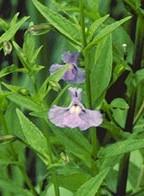 Also called Allegheny monkey flower or square-stemmed monkey flower, this herbaceous perennial is native to North America where it grows in wet soils such as wet meadows, swamps, stream and pond borders, floodplains, and drainage ditches. It is a member of the lopseed family, Phrymaceae, a small family in the same order as jasmine, basil, and snapdrgon. Plants are erect with square, occasionally branching stems that bear opposite, clasping (sessile) leaves. The medium green leaves are lanceolate to oval, four to six inches long and one inch wide, with widely spaced teeth on the margins and pointed tips. The lilac-blue (occasionally pink or white) flowers are produced in the axils of the leaves on the upper half of the stem over a one and half month period from summer into fall and attract butterflies, bees, and other pollinators. Each snapdragon-like flower is two lipped, an inch across, bears a yellow patch in its throat, and is thought to resemble the face of a monkey. Flowers are followed by a seed capsule with many seeds that are dispersed by wind or water. Monkey flower is an excellent choice for a bog garden, the wettest part of a rain garden, or any other consistently moist area. The genus name, Mimulus, is from the Latin word mimus meaning actor in a farce and refers to the resemblance of the flowers to the face of a monkey. The specific epithet, rigens, comes from the Latin word ringi meaning to open the mouth wide, and also refers to the monkey-like flowers.
Also called Allegheny monkey flower or square-stemmed monkey flower, this herbaceous perennial is native to North America where it grows in wet soils such as wet meadows, swamps, stream and pond borders, floodplains, and drainage ditches. It is a member of the lopseed family, Phrymaceae, a small family in the same order as jasmine, basil, and snapdrgon. Plants are erect with square, occasionally branching stems that bear opposite, clasping (sessile) leaves. The medium green leaves are lanceolate to oval, four to six inches long and one inch wide, with widely spaced teeth on the margins and pointed tips. The lilac-blue (occasionally pink or white) flowers are produced in the axils of the leaves on the upper half of the stem over a one and half month period from summer into fall and attract butterflies, bees, and other pollinators. Each snapdragon-like flower is two lipped, an inch across, bears a yellow patch in its throat, and is thought to resemble the face of a monkey. Flowers are followed by a seed capsule with many seeds that are dispersed by wind or water. Monkey flower is an excellent choice for a bog garden, the wettest part of a rain garden, or any other consistently moist area. The genus name, Mimulus, is from the Latin word mimus meaning actor in a farce and refers to the resemblance of the flowers to the face of a monkey. The specific epithet, rigens, comes from the Latin word ringi meaning to open the mouth wide, and also refers to the monkey-like flowers.
 Type: Herbaceous perennial
Type: Herbaceous perennial
Bloom: Two lipped flowers in lilac-blue, (occasionally pink or white) in summer into fall
Size: 12-36″ H x 8-12″ W
Light: Part shade to full sun (with adequate water)
Soil: Average, wet to moist
Care: Low maintenance
Hardiness: Zones 3-8
Pests and Diseases: Generally healthy but susceptible to damage by slugs, snails, powdery mildew
Propagation: Seed, division
Companion Plants: Boneset (Eupatorium perfoliatum), Blue vervain (Verbena hastata), Sneezeweed (Helenium autumnale), Swamp milkweed (Asclepias incarnata), Swamp goldenrod (Solidago patula).
